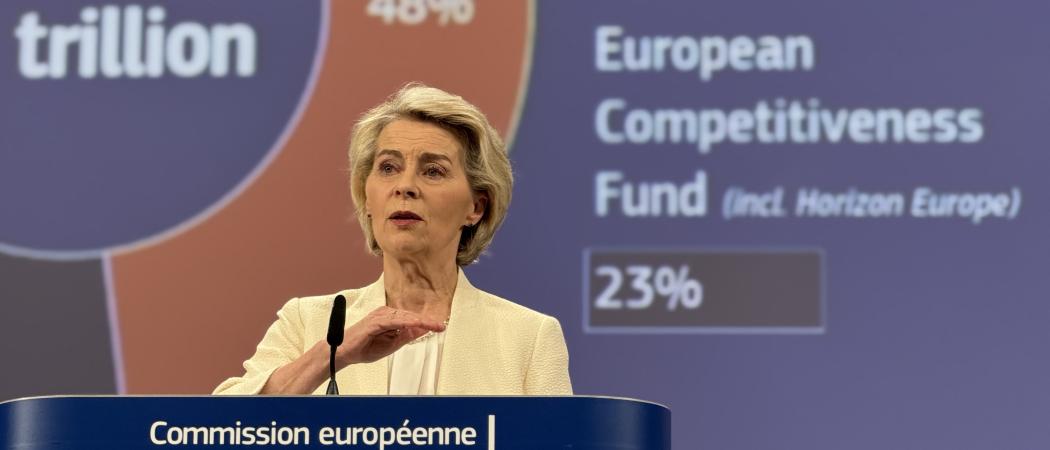Horizon Europe is set to continue after 2027 with an enhanced budget and a new four-pillar structure

European Commission president presented a proposal that foresees €175 billion for research and innovation in the 2028-34 EU budget. Photo: Eleonora Francica, Science|Business
The European Commission has presented plans to almost double Horizon Europe’s budget to €175 billion under the next long-term budget for 2028-34. The tenth Framework Programme for research and innovation will remain "standalone" within a wider €409 billion European Competitiveness Fund (ECF).
“[Horizon Europe] is already a big programme, it is one of the most renowned programmes we have worldwide, the most renowned scientific research programme. We will double it,” Commission President Ursula von der Leyen said as she presented the budget plans on July 16.
The proposed budget is part of a €2 trillion Multiannual Financial Framework (MFF) due to start in 2028. The overall figures, as well as the Horizon Europe allocation, are not final as they will have to go through years of haggling between the European Parliament and member states, with an agreement envisioned by the end of 2027.
The structure is identical to a draft plan that was leaked last week, which saw Horizon Europe remain a standalone programme structured in four pillars: excellent science, competitiveness and society, innovation, and European Research Area.
EU research Commissioner Ekaterina Zaharieva presented the Horizon Europe budget and structure to EU research ministers gathered in Copenhagen for a meeting organised by the Danish presidency of the Council of the EU. A breakdown of the budget across the four pillars shows the Commission is planning to double the budget of the European Research Council and triple the budget of the European Innovation Council.
The proposal arrived after a long discussion which lasted until the very last minute, budget commissioner Piotr Serafin said before presenting the MFF proposal to the European Parliament’s budgets committee on July 16. The day before, president von der Leyen along with Serafin presented the plan to each commissioner in trilateral meetings.
The proposal marks a partial victory for research stakeholders and MEPs, who had been worried about plans to dismember the programme and subsume it entirely under the ECF. They have also been calling for a budget of at least €200 billion.
However, chances are that even the proposed €175 billion will be pared back during negotiations. Last time around, the Commission’s 2018 proposal for €120 billion was cut down significantly during negotiations.
The current iteration of Horizon Europe started in 2021 with a budget of €95.5 billion which was further pared back to €93.5 billion. Of that total amount, €5 billion were a top-up from the EU’s pandemic recovery fund. According to Commission math, starting from the current €88.5 billion base figure, the budget for the next iteration of Horizon Europe would be nearly double to €175 billion.
The ‘end’ of a long fight
The proposal ends months of speculation over the shape and size of Horizon Europe in the ECF. Rumours started when an internal Commission memo dated September 2024 was leaked to lobbyists and journalists in Brussels. Later, the absence of Horizon Europe from the European Commission’s Competitiveness Compass strategy only fuelled such fears.
In May, von der Leyen confirmed in that the next research framework programme would remain independent from the ECF, reaffirming that Horizon Europe would continue as a “self-standing” programme in the next budget cycle.
German MEP Christian Ehler, who was co-rapporteur for the current Horizon Europe programme, praised Zaharieva, “who managed to defend both the budget and the integrity” of the Framework Programme.”
In a statement, Ehler also welcomed the “revolutionary” ECF proposal, but warned that his European People’s Party (EPP) “will not stand for seamless budget flexibility, top-down industrial planning, or a false promise of simplification.”
Under the ECF, the Commission plans to multiply by five its investments in defence and space, bringing the total to €131 billion. Digital investments would also increase five-fold, while cleantech, the bioeconomy and decarbonisation would see their budget multiplied by six. So far, it is unclear what will be included in these investments. The ECF will include a target of 43% of climate and environment investments, compared to 35% across the EU budget as a whole.
Tough MFF negotiations ahead
As things stand after a tense day in Brussels, the Parliament and the Commission are set to lock horns during upcoming negotiations.
Serafin was grilled by MEPs in the budget committee during a session scheduled ahead of a press conference chaired by von der Leyen. MEPs said the plans were drawn up without sufficient consultation and the Commission failed to keep up its promise to share the proposal with the Parliament before the press. “There is a lot of good will in this house but you’re really emptying the bucket,” committee chair Johan Van Overtveldt told Serafin.
Siegfried Mureşan, EPP’s co-rapporteur for the MFF, expressed concern at the lack of role for the Parliament in the ECF, which he sees “mainly as an umbrella for merging existing programmes.” He also pointed out that the budget increase will go towards inflation and debt repayments incurred by the pandemic recovery fund, with “no penny for the beneficiaries.”
Carla Tavares, co-rapporteur for the Socialists and Democrats, said MEPs “will not hesitate to fully flex our muscles,” in scrutinising the budget. “However you try to package this, what we have is a real-terms investment and spending freeze,” the co-rapporteurs added in a statement after the meeting.
Editor's note: This story was updated 17 July 2025.





 A unique international forum for public research organisations and companies to connect their external engagement with strategic interests around their R&D system.
A unique international forum for public research organisations and companies to connect their external engagement with strategic interests around their R&D system.